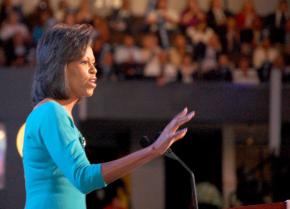Feeding us a fairytale
In her speech for the Democratic convention, Michelle Obama described an America where you can be anything you want to be. That just isn't true, writes .
MEDIA PUNDITS went wild for Michelle Obama's speech on the opening night of the Democratic National Convention.
Every aspect of the moment was dissected--from the number of tweets during her speech (28,000) to the grade level at which it was written (12th--five levels above Ann Romney's). It was particularly nauseating to wade through the thousands of words devoted to the details of her dress, where she bought her shoes and, of course, the never-ending commentary on her biceps.
But the main point that everyone agreed on is that Michelle Obama's speech was carefully designed to make the Obamas seem in touch with the lives and struggles of ordinary people. And it seems like she was at least partially successful. Polls show that Michelle Obama is the most popular of all the figures in the presidential race, with 64 percent of respondents holding a favorable view of her.
Certainly, coming a week after the richer-than-rich and whiter-than-white Republican convention, it was a welcome change to see a strong Black woman take center stage. But if you scratch beneath the surface of its feel-good sentimentality, Obama's speech was an insult to millions of people who are struggling and still find themselves falling behind. This is particularly true for two demographics she was meant especially to appeal to--Blacks and women.

THE CENTRAL narrative of her speech was contained in her claim, "Here in America, there is always something better if you are willing to work for it." She then went on to tell a personal story of sacrifice, hard work and success. She described how her father, though suffering from multiple sclerosis, never took a sick day and went on to send his kids to college. She talked about her and Barack being "so young, so in love and so in debt." Flash forward to the young couple all grown up and running the most powerful country in the world.
The promise is that if you, too, work hard and sacrifice and struggle, you will also eventually succeed. But the reality for millions of people in this country is that they are falling further and further behind. So wrapped up in the false promise of a better future is the implication that if you don't succeed, it's your fault--that you aren't working hard or sacrificing enough.
In fact, despite the "I feel your pain" platitudes, Michelle Obama's speech was filled with a sense of moral superiority. This was perhaps no more true than when she was talking about her father. In describing how her father was never late with a tuition payment, she tells us: "See, for my dad, that's what it meant to be a man."
So if, like millions of Black men, you are incarcerated or unemployed, you are not a man? At a time when an entire generation of young Black men is being locked away and simultaneously scapegoated for not providing for their families, the first lady's portrait of the good Black father seems like a slap in the face.
Similarly, she talks about Barack Obama's grandmother watching while less-qualified men received promotions that she deserved while her family barely scraped by. But instead of using this story to shine a spotlight on the continuing inequality faced by women, the lesson she offers is one of continuing to work harder than anyone else, "without complaint and without regret."
Again, this seems woefully out of touch with the lives of most women in this country. At a time when 40 percent of families are headed by women and more than 25 percent of Black women live in poverty, exhortations to work harder simply don't cut it.
Her portrait of a family that eats dinner together every night and whose greatest worry is how dad's new job as president will change them may make for good politics, but it says nothing about the challenges facing real families in this country--the vast majority of which are nothing like the Obamas.
Michelle Obama couldn't talk about any of these realities because her story was not a story of the real struggles facing working people today. Instead, her speech was a carefully constructed story of the American Dream. And like all stories of the American Dream, it conveniently left out one of the most fundamental pillars of this country--the racism on which it was built and on which it still relies today. While there were glancing nods to equal pay for women and same-sex marriage, her speech had nothing to say about the rise of mass incarceration, police brutality or Black unemployment.
In fact, it seemed like Michelle Obama's speech was designed to be as acceptable to the political establishment as possible. And in today's "post-racial" America, talking about institutional racism is simply not acceptable--and demanding structural changes to address systematic discrimination is even less so. Thus, she could talk about how she and Barack relied on help from student loans or how Americans might need assistance to pay their medical bills, but she didn't talk about the help of social programs like food stamps or welfare--both of which are racialized and stigmatized.
In the end, her speech fits neatly with the politics of personal responsibility. Hardship is universalized. It is not the product of institutional policies or the greed of the banks or systematic discrimination. It is just part of the American experience--a temporary obstacle to be overcome through hard work and sacrifice. And all without complaint.
Michelle Obama fed people a fairytale last week--a whitewashed, sanitized fairytale. But for millions of people--and more every day--the reality of life in this country is not the American Dream, but, in Malcolm X's words, the American nightmare.
No amount of hard work or sacrifice can erase that fact. It's damn time we start complaining.


